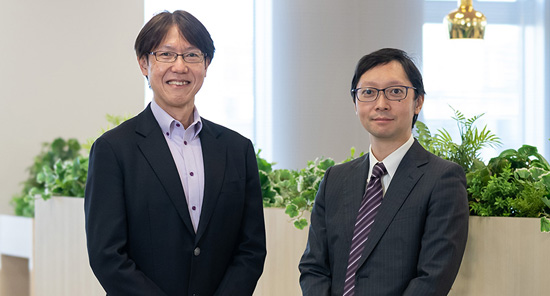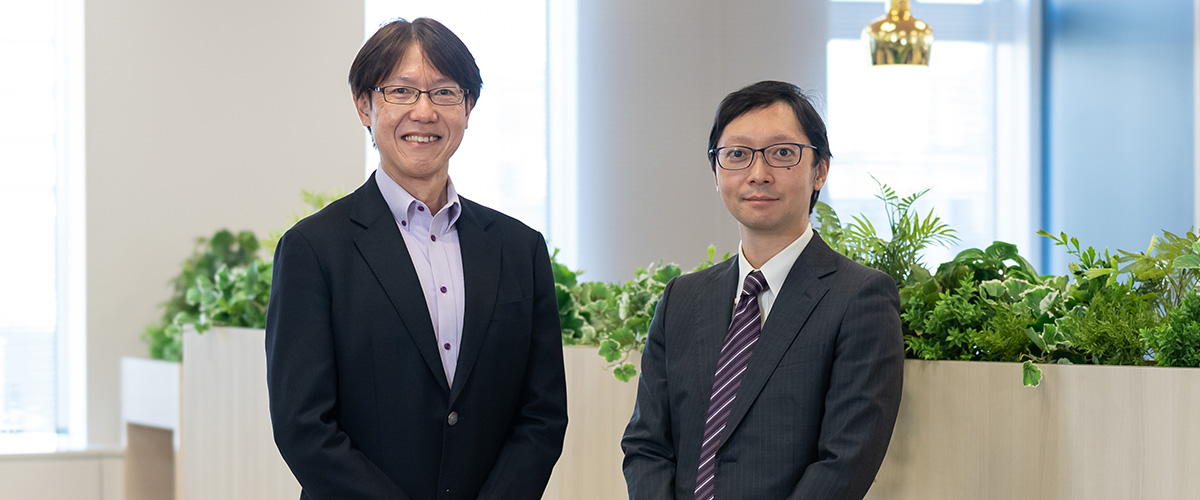

Men's Participation in Childcare
at Astellas
- Head of Information System Shinya Suda
-
Cybersecurity Group,
Information System Ryoma Nishikawa
*The contents of this article, and the divisions that the people featured in this article belonged to
and the names of those divisions are current as of the time of the interview.
What kind of communication was there when you were talking about taking paternity leave?
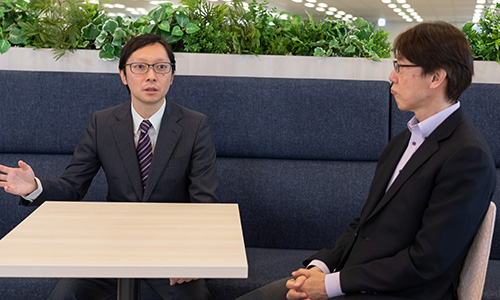
Nishikawa I heard that no men in the Information System Division had taken paternity leave before, so I was a little nervous about how my colleagues would react, but our division is always positive and flexible to change, so I was never hesitant. My manager was surprised but very helpful with adjusting my tasks.
Suda I do not have any children myself, so honestly speaking, when Mr. Nishikawa told me he would like to take paternity leave, I could not clearly imagine what he could do to help with child-rearing. So I asked him frankly, “what will you do?” and he told me, “this is our second child, so I can look after the first child, and do all sorts of other things”. After hearing he could do all of these things, I honestly thought “that sounds tougher than office work……!” He will be in a more challenging environment than here, so I felt it was awkward to call it “leave” from a company management perspective; I thought “that sounds more like a ‘secondment’”, which is why I used that term when I made the announcement at our regular team meeting.
How did your team members react once they found out?
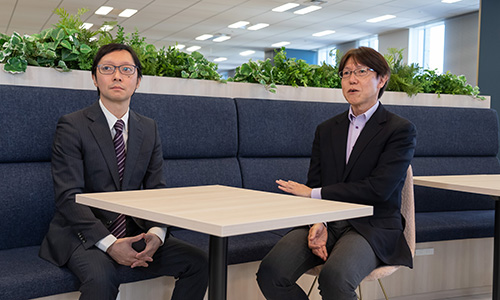
Suda I announced that “Mr. Nishikawa will be seconded to concentrate on housework and child-care”, and in the beginning, the reactions were, “What?” “So, he is taking time off?”. But I explained that “he will be working in a more challenging environment for a while” and they understood why I used the term ‘transfer’, and they nodded and said “I see” or “that’s true”.
Nishikawa They were greatly positive that I made this decision for my family, and gave me warm comments such as “Leave your work to us!” I thought this really is a great company.
Suda I expect the working environment here to be one of helping each other. I tell my team members often that, in times that you have to take sick leave or take a day off because your child is ill, then do not say “sorry”, but say “thank you”. I think that changes your mindset and the next time someone is in such situation, you would naturally think of helping that person. I think that instead of saying “sorry” and being hard on yourself, you should say “thank you” and involve others.
Did you have any new insights regarding your work while you were taking paternity leave?
Nishikawa During my paternity leave, I did not think about work at all, and I hardly contacted my colleagues. I was surprised that I could put work aside and concentrate so much on home.
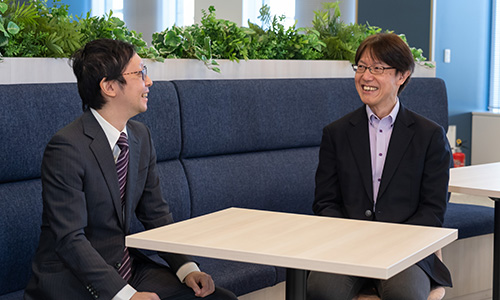
Suda Children need 24-hour care, and that is very tough… so I thought “we will take care of the office work for you. The company cannot cover the housework for you so concentrate on that.” But even during paternity leave, Mr. Nishikawa remains a member of the Information System Division and our colleague, so everyone was free to contact him to communicate matters not directly related to his tasks, such as organizational changes and resigning from the company.
Nishikawa I had access to company information, so I could catch up on urgent situations if needed. I ended up not accessing it, though.
What do you think is important for making it easier to take paternity leave?
Nishikawa I think we should share with each other that there are many situations where you should take a break from work or shorten your work hours. Through the process of taking paternity leave, I learned that there are many people taking leave or working part-time temporarily, not just for their children but to take care of their parents or for other reasons. I think young people cannot imagine such situations clearly and feel hesitant to take leave when others are working. I think many people work mostly “for the family”, and during your long professional career, I think it is usual to have some breaks in between for family reasons. If your managers and colleagues are very understanding and you can trust them, then taking leave should not be so worrying.
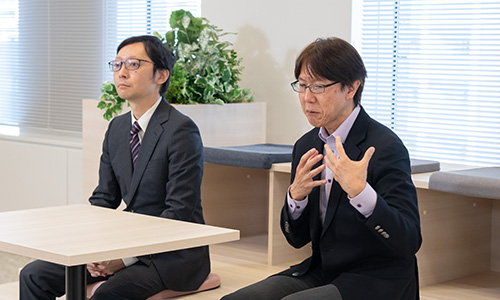
Suda I think it is necessary to recognize the “unconscious bias” that the job at the company is the only work the person has, and we need to consciously eliminate that bias. If the company management could think from a different perspective, and think that the company is borrowing the time of the employee from the employee himself and his family, would that not make a difference? And I also think that if everyone could discuss child-care or housework in the same way we discuss our work here in the office, that might be effective. People working here have different values and perspectives, so we need to compromise to be able to work in the same environment. The solution does not have to be the same each time. Last time it was like this, but this time we can work it out differently. If we could discuss why we made that decision each time, we do not necessarily have to share exactly the same opinion. And from the manager’s standpoint, I think it is important to keep saying “you can do that” and “you have the right to do so”. Personally, I would be most disappointed to hear “I didn’t know I was allowed to do that”.
What do you think we can do to make it easier to accept and respect each other’s personal lives, such as child-care, illness, or nursing family?
Nishikawa Something that I can do now is to show that men can also take parental leave. I have experience to share, and can actively share it whenever I am asked to do so, and I can also talk about it personally and let everyone know they have colleagues who work this way and live this way.
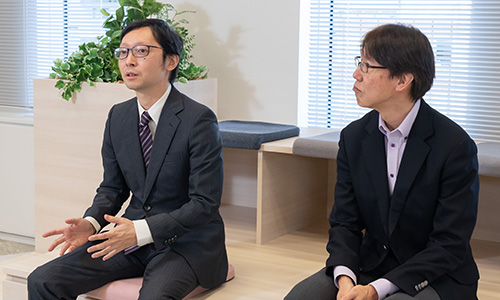
Suda I will keep telling my members that they “can” and “have the right” to do so. And another thing I can do is to tell everyone how I have been helped by others, in a humorous way. Actually, about ten years ago, I had to leave work for about four months due to illness. It was not planned leave, obviously, so one day, I abruptly had to say, “I will be taking leave from today”, but the people around me were helpful and things worked out as usual. I stand here today thanks to them. By telling my own experience often, I hope everyone will be less hesitant to ask for help.
Any final words to your colleagues who are considering taking paternity leave, or any advice to their managers?
Nishikawa Make it clear that you want to take paternity leave when communicating with your colleagues. There is no need to hesitate, you should trust that the people around you will be helpful. And absorb yourself in spending time with your children. My tip is to be prepared to hand over your tasks at any time, and do not personalize the tasks assigned to you. If you could keep your work this way all the time, it will be easier to hand over your tasks when you have to take leave suddenly.
Suda In Mr. Nishikawa’s case, his paternity leave was four months long. Four months may feel like a long period of time, but when it is over, I am sure you will feel like it was short. If there is anyone hesitating about taking paternity leave, I think he should take it easy. The same applies to their managers. Paternity leave is short. You can expect him to become more capable during his leave and show greater presence when he comes back. You should be the first one to send him warm wishes.
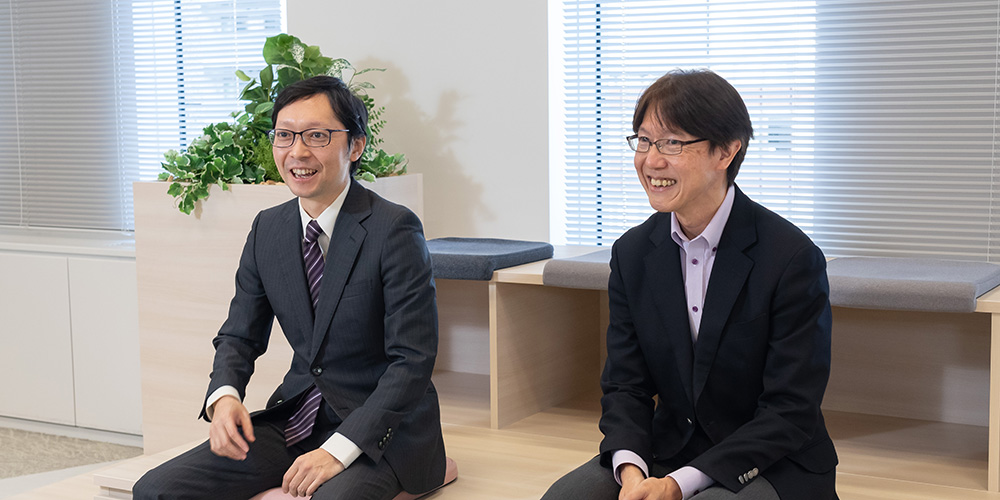
Cross talk Interview
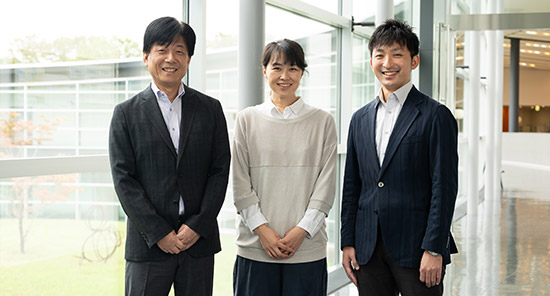
CROSS TALK×INTERVIEWFinding and utilizing individual talent.
Realize new drug discovery through a unique organization that combines the stability of pharma with the agility of biotech.
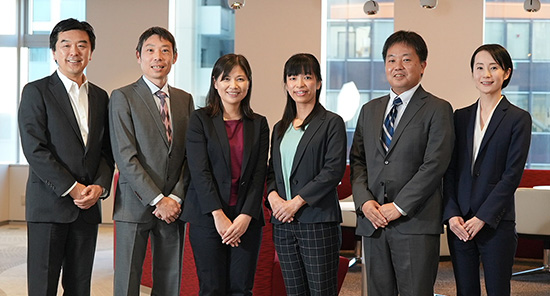
CROSS TALK×INTERVIEWResearch, Development and "Ikuyaku"(Drug Fostering and Evolution) ...
The many thoughts on drug discovery story from XOSPATA®
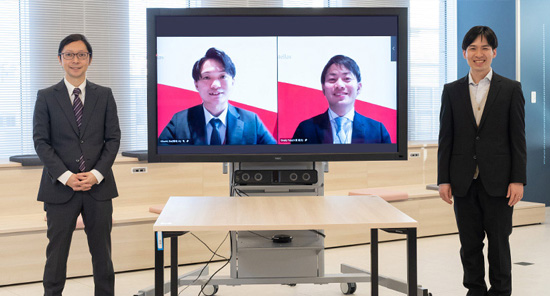
CROSS TALK×INTERVIEWMen's Participation in Childcare at Astellas
